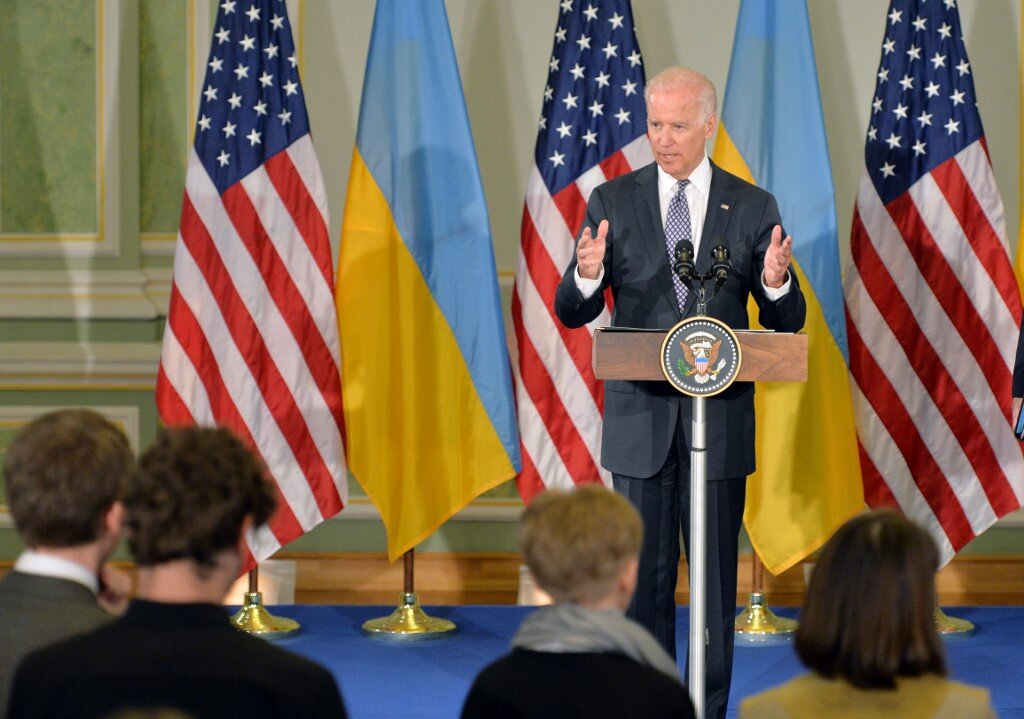It’s no secret that U.S. President-elect Joseph Biden is quite familiar with Ukraine and its security challenges.
Having served as vice president under Barack Obama in 2009-2017, he was in charge of dealing with Kyiv after Russia annexed Crimea and unleashed a bloody war in Donbas in 2014.
The fact that Biden paid five official visits to Ukraine since the outbreak of the war says it all. Along with Ukraine-friendly members of the U.S. Congress, he was the mastermind behind the policy of non-recognition of Russia’s occupation, of anti-Kremlin sanctions and also of providing Ukraine with defense aid.
Ever since then, the U.S. — including under the Trump administration — has delivered security assistance to Kyiv, worth in total more than $1.5 billion, helping to modernize Ukraine’s military and make it potent for confronting Russia-sponsored proxies in the Donbas.
The Obama-Biden administration, however, has faced criticism over its reluctance to provide Kyiv with long-sought lethal weaponry, such as the tank killers FGM-148 Javelin, which was once the holy grail of Ukraine’s defense community. The Trump administration eventually provided the missiles.
Still, according to Biden himself and expert evaluations, Ukraine has good reason to be optimistic about America’s support in the war, including the provision of new lethal hardware and money for training and modernization.
Ukraine still enjoys very broad bipartisan support in Congress. The incoming U.S. ambassador to Kyiv is very supportive of increasing defense aid, and the president-elect is being clear about staying the course and going tough on Russia.

US President-elect Joe Biden gestures in celebration after delivering remarks in Wilmington, Delaware on Nov. 7, 2020 after being declared the winner of the presidential election. (AFP)
Focus on Ukraine
Biden repeatedly emphasized his Ukraine policy, particularly regarding military affairs, during the 2019-2020 presidential campaign.
“I would make Ukraine a U.S. foreign policy priority,” he told the Council on Foreign Relations. “On the military side, I would provide more U.S. security assistance — including weapons — to strengthen Ukraine’s ability to defend itself. I would also expand the successful training mission for the Ukrainian Armed Forces that was initiated by the Obama-Biden administration.”
Apart from millions of dollars of non-lethal equipment, such as advanced night vision scopes or jet pilot helmets, in recent years the U.S. has provided Ukraine with 360 Javelin missiles and 47 launchers to a total value of $86 million.
That was followed by the U.S. handover of two Island-class patrol boats to Ukraine’s navy, which were provided at no cost, although Kyiv paid $10 million to get the boats to Odesa and put them in order.
The U.S. advanced combat training mission at the Yavoriv boot camp in Lviv Oblast continues, too.
Moreover, in late 2017, the U.S. Department of State approved the commercial sale of Barrett M82 sniper rifles valued at $41.5 million.
In his address to congratulate Ukrainians on their Independence Day on Aug. 24, Biden again reassured that, under his administration, Ukraine would “get the economic and military support that it needs, including lethal weapons, while urging Ukraine to pursue the essential reforms that are vital to its success.”
The candidate did not miss a chance to criticize President Donald Trump and recalled the latter’s attempt to withhold as much as $391 million in defense aid to force Kyiv to investigate Biden ahead of the elections.

Then-U.S. Vice President Joe Biden speaks to students of the Diplomatic Academy of Ukraine during his visit in Kyiv on April 22, 2014. Biden accused Russia of “trying to pull Ukraine apart” and pledged Washington’s strong support for Kyiv’s leaders. (AFP)
Bipartisan support
Experts polled by the Kyiv Post are generally quite optimistic about the Biden administration and defense assistance to Ukraine in the coming years.
The Ukraine-friendly faction in U.S. Congress, represented by both parties in both chambers, is still going strong and, moreover, has recently tried to expand U.S. appropriations on military support for Ukraine. In July, the House of Representatives’ appropriations committee suggested spending $275 million, although the financial year 2021 budget was approved with the more usual $250 million prepared for Kyiv’s war effort. A group of senators even suggested increasing the annual amount to $300 million.
The same can be said of the State Department and the Pentagon, which have never low on sympathy for Ukraine.
Moreover, in the nearest future, Kyiv expects to welcome a new full-fledged ambassador in the country: retired General Keith Dayton, who is also known as a fierce Ukraine advocate and strong supporter of Ukraine’s military.
During his confirmation hearing in the Senate in early August, Dayton said he believed providing Kyiv with more aid was “a very good idea” and something he endorsed “wholeheartedly.”
In general, things on all fronts are looking good in terms of more lethal aid to Ukraine — the time when the White House could hesitate about it has changed, says Mattia Nelles, the program director for Ukraine at the Center for Liberal Modernity, a Berlin-based think-tank.
“Under the Obama administration, it was Angela Merkel and other European leaders who strongly objected to U.S. delivery weapon systems like the Javelins,” he said.
“Since then, the geopolitical context changed and European relations with Russia have soured significantly.”
Now with Biden, German policymakers expect a more constructive relationship with Washington D.C. and a more coordinated approach toward Kyiv and Moscow. Very few in Berlin expects Biden to derail U.S. military support for Ukraine, although many still fear that advanced weapon supplies may derail the fragile ceasefire in Donbas.
“Overall, the Biden presidency and administration will be a net win for Ukraine as the president and some of his key advisors are well accustomed to the country, the reform process and its many problems,” Nelles added.
“At the same time, the administration has many global crises to deal with and it remains to be seen how much attention can be dedicated to Ukraine. Nevertheless, I expect the Biden administration to be more assertive vis-à-vis Russia, and I assume that it is likely to keep key elements of the U.S. China policy. The latter might put Ukraine, which is very open to Chinese trade and investment, in a tight spot.”

In this file photo taken on Oct. 9, 2020, Democratic presidential candidate and former U.S. Vice President Joe Biden waves as he arrives to speak at a drive-in rally outside the Southeast Career and Technical Academy in Las Vegas, Nevada. (AFP)
Some strings attached
Importantly, Biden’s platform states that he would “ensure that all U.S. assistance to Ukraine is strictly conditioned on anti-corruption” and other reforms.
And when it comes to U.S. military assistance, Ukraine still can’t say it is spending the generous aid wisely.
“The Biden administration is facing a difficult task in stimulating its Ukrainian partners to spend its own funds in a transparent and effective way,” says Hlib Kanievskyi, the chairman of Kyiv-based anti-graft watchdog StateWatch.
“In my opinion, the key question is not whether the Biden administration is going to expand military aid to Ukraine, but whether it is going to reconsider its requirements regarding Kyiv’s anti-corruption liabilities in terms of the Armed Forces support and defense production industry reforms.”
“The thing is that Washington considers Moscow a threat to its own geopolitical interests. Therefore, Ukraine will always get its share of finances and military hardware from the American people. Kyiv understands this too, and it can be said that this situation is being made use of shamelessly.”
For instance, according to Kanievskyi, after six years of war, Ukraine’s Defense Ministry still spends its own budget ineffectively, and dubious procurement tenders are still in place. According to the watchdog’s estimates, the total amount of overdue receivables at the ministry reaches over Hr 2.4 billion ($85 million) in 2020.
“This means that the military department’s officials have transferred close to $100 million to accounts of sham companies that never fulfilled their contractual obligations. Try and evaluate how many thermal vision scopes or drones, which Ukraine wants to get from the U.S., could have been purchased (with Ukraine’s own money).”
And if the Biden administration succeeds in making Ukraine’s defense ministry be more effective in spending, U.S. defense aid will finally become a full-fledged factor of Ukraine’s military superiority in the hybrid war, Kanievskyi added.
Meanwhile, the next few years promise to bring even more of the vital U.S. assistance for Ukraine’s military. Among crucial projects expected to come true soon are the handover of three more Island-class patrol boats and a contact to sell up to 16 brand new Mark VI patrol boats with all appropriate equipment, worth nearly $600 million.
Moreover, there’s a chance now that Ukraine’s navy will finally get ship killer missiles, which it lacks at the moment. In early August, Ukraine’s military said the Mark VI boats would be equipped with U.S.-produced ВGM-176В Griffin anti-ship missiles — which also indicated American readiness to send more advanced and sophisticated weaponry to help deter Russia.
